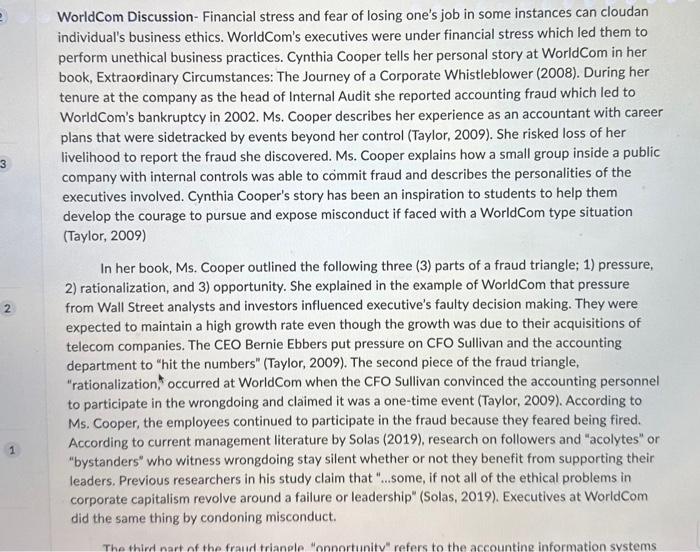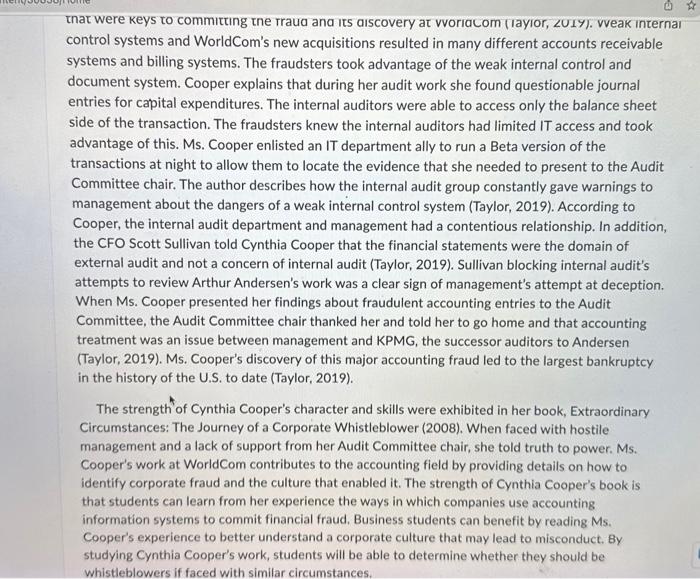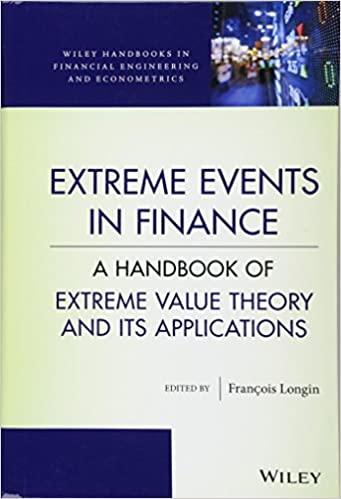1) What was the ethical misconduct in the WorldCom case?
2) What management behaviors led to the financial fraud that was committed?
3) What would you do if you were faced with a similar situation? 
WorldCom Discussion- Financial stress and fear of losing one's job in some instances can cloudan individual's business ethics. WorldCom's executives were under financial stress which led them to perform unethical business practices. Cynthia Cooper tells her personal story at WorldCom in her book, Extraordinary Circumstances: The Journey of a Corporate Whistleblower (2008). During her tenure at the company as the head of Internal Audit she reported accounting fraud which led to WorldCom's bankruptcy in 2002. Ms. Cooper describes her experience as an accountant with career plans that were sidetracked by events beyond her control (Taylor, 2009). She risked loss of her livelihood to report the fraud she discovered. Ms. Cooper explains how a small group inside a public company with internal controls was able to commit fraud and describes the personalities of the executives involved. Cynthia Cooper's story has been an inspiration to students to help them develop the courage to pursue and expose misconduct if faced with a WorldCom type situation (Taylor, 2009) In her book, Ms. Cooper outlined the following three (3) parts of a fraud triangle; 1) pressure, 2) rationalization, and 3) opportunity. She explained in the example of WorldCom that pressure from Wall Street analysts and investors influenced executive's faulty decision making. They were expected to maintain a high growth rate even though the growth was due to their acquisitions of telecom companies. The CEO Bernie Ebbers put pressure on CFO Sullivan and the accounting department to "hit the numbers" (Taylor, 2009). The second piece of the fraud triangle, "rationalization," occurred at WorldCom when the CFO Sullivan convinced the accounting personnel to participate in the wrongdoing and claimed it was a one-time event (Taylor, 2009). According to Ms. Cooper, the employees continued to participate in the fraud because they feared being fired. According to current management literature by Solas (2019), research on followers and "acolytes" or "bystanders" who witness wrongdoing stay silent whether or not they benefit from supporting their leaders. Previous researchers in his study claim that "...some, if not all of the ethical problems in corporate capitalism revolve around a failure or leadership" (Solas, 2019). Executives at WorldCom did the same thing by condoning misconduct. that were keys to committing the rraud and its aiscovery at vvoriacom (Iayor, U1Y). vveak internai control systems and WorldCom's new acquisitions resulted in many different accounts receivable systems and billing systems. The fraudsters took advantage of the weak internal control and document system. Cooper explains that during her audit work she found questionable journal entries for capital expenditures. The internal auditors were able to access only the balance sheet side of the transaction. The fraudsters knew the internal auditors had limited IT access and took advantage of this. Ms. Cooper enlisted an IT department ally to run a Beta version of the transactions at night to allow them to locate the evidence that she needed to present to the Audit Committee chair. The author describes how the internal audit group constantly gave warnings to management about the dangers of a weak internal control system (Taylor, 2019). According to Cooper, the internal audit department and management had a contentious relationship. In addition, the CFO Scott Sullivan told Cynthia Cooper that the financial statements were the domain of external audit and not a concern of internal audit (Taylor, 2019). Sullivan blocking internal audit's attempts to review Arthur Andersen's work was a clear sign of management's attempt at deception. When Ms. Cooper presented her findings about fraudulent accounting entries to the Audit Committee, the Audit Committee chair thanked her and told her to go home and that accounting treatment was an issue between management and KPMG, the successor auditors to Andersen (Taylor, 2019). Ms. Cooper's discovery of this major accounting fraud led to the largest bankruptcy in the history of the U.S. to date (Taylor, 2019). The strength of Cynthia Cooper's character and skills were exhibited in her book, Extraordinary Circumstances: The Journey of a Corporate Whistleblower (2008). When faced with hostile management and a lack of support from her Audit Committee chair, she told truth to power. Ms. Cooper's work at WorldCom contributes to the accounting field by providing details on how to identify corporate fraud and the culture that enabled it. The strength of Cynthia Cooper's book is that students can learn from her experience the ways in which companies use accounting information systems to commit financial fraud. Business students can benefit by reading Ms. Cooper's experience to better understand a corporate culture that may lead to misconduct. By studying Cynthia Cooper's work, students will be able to determine whether they should be









